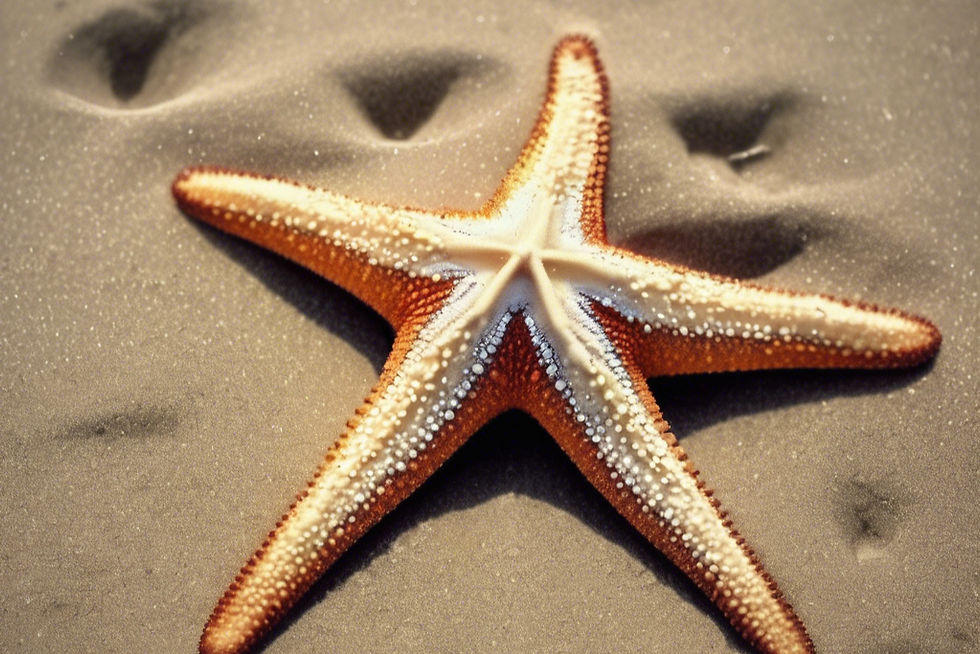Soulful Sundays: Altruism
- Blake Storey
- Aug 16, 2025
- 3 min read
“Never doubt that a small group of thoughtful, committed citizens can change the world. Indeed, it’s the only thing that ever has.”
— Margaret Mead

When life feels overwhelming or meaningless, we can remember the parable of the starfish. After a great storm, thousands of starfish were washed onto the shore. The next morning, a man walking along the beach surveying the devastation noticed a young girl running back and forth. She would bend down, pick up a starfish, and throw it into the sea. The man approached her and said, “What are you doing? There are far too many. You’ll never make a difference.” The girl paused, lifted another starfish, and hurled it into the water. Looking back at him, she said, “It made a difference to that one.”
Any act of kindness, no matter how small, always matters.
When we contemplate the classic virtues, none rise more sharply to the top than altruism—the sacrifice of one’s own gain for the good of another. It may well be the pinnacle of human flourishing. Some even argue that sacrifice itself is the keystone of civilization. Yet within this noble idea lies a shadow. At times, service to others is used not as a true gift, but as a mask for our own deficiencies in growth. The martyr is not always motivated purely by compassion; often, what is sought is not to serve, but to be seen as serving. And that is where altruism becomes complicated.
The tension between giving and receiving makes itself known in nearly every human relationship. In many ways, the human brain itself evolved to navigate these waters. The familiar claim that we use only ten percent of our brain is misleading—especially when we consider how much of our mental energy is devoted to analyzing even the simplest of conversations. Brain scans show enormous activity as we process tone, expression, and subtle cues. Studies of autism further highlight this truth: when key areas of emotional regulation and social awareness are underdeveloped, the very fabric of human interaction falls apart.
With deeper reflection, it becomes clear that within every act of altruism there is also a measure of self-benefit. Buddhist philosophy speaks directly to this truth: when we see others as part of ourselves, helping them is, in a sense, helping ourselves. In this way, altruism reveals its paradoxical nature—what appears as selfless giving is also a quiet form of self-nourishment. This is not something to fear or dismiss, but something to embrace. The cycle completes itself: by helping others, we are, in fact, helping ourselves.
No other species invests so heavily in the well-being of its own kind. Considering our diverse genetic makeup, it is astonishing to see civilizations built around shared languages, shared systems of value, or shared faiths. At the root of all these structures lies a single, universal currency: trust. Trust that, at the end of the day, most of us are, in our own way, looking after one another. This is underscored by the moral imperative of the Golden Rule—treating others as we would like to be treated.
So when we lament that the system is flawed, it is only partly true. Yes, capitalism is designed to maximize free trade and competition. But capitalism is only one device of civilization—and that civilization is, at its foundation, anchored in a sacrificial paradigm. Public works like roads, bridges, and schools—these are all expressions of collective altruism. In reality, no society has ever been purely capitalist, nor purely communist. They are all hybrids.
The power of competition is undeniable; history showed us what happened in the Soviet Union when meritocracy was abandoned—workers produced lamps weighing a hundred pounds apiece simply to meet quotas by weight rather than by quality. Yet the reverse extreme is just as destructive. During America’s Gilded Age, the robber barons sacrificed human dignity and health for profit. As Upton Sinclair’s The Jungle exposed, companies were poisoning their own workers and the public they served.
Thus, it is essential to strike a balance. It is essential to recognize our responsibility in this interplay. As Mead reminded us, it is always small groups of committed people who change the world. We must stay motivated. We must focus on altruism—but without deceiving ourselves into thinking that others must come before our needs. Instead, they must become part of our needs. We must maintain the separation between self and other AND also persevere its interdependence.
If we set our intentions toward the highest horizon,
If we believe abundance comes from creativity and cooperative,
If we learn to care for ourselves and each other more wholesomely and less deceptively,
Then there is no limit to what we can accomplish.



I’m not looking for abundance I’m looking for clarity not charity.